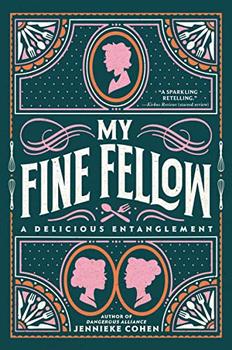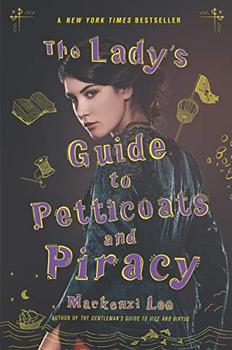Summary | Excerpt | Reviews | Beyond the book | Read-Alikes | Genres & Themes | Author Bio

Culinary delights abound, romance lingers in the air, and plans go terribly, wonderfully astray in this gender-bent take on My Fair Lady from Jennieke Cohen, author of Dangerous Alliance - perfect for fans of Bridgerton or A Gentleman's Guide to Vice and Virtue.
It's 1830s England, and Culinarians—doyens who consult with society's elite to create gorgeous food and confections—are the crème de la crème of high society.
Helena Higgins, top of her class at the Royal Academy, has a sharp demeanor and an even sharper palate—and knows stardom awaits her if she can produce greatness in her final year.
Penelope Pickering is going to prove the value of non-European cuisine to all of England. Her contemporaries may scorn her Filipina heritage and her dishes, but with her flawless social graces and culinary talents, Penelope is set to prove them wrong.
Elijah Little has nothing to his name but a truly excellent instinct for flavors. London merchants won't allow a Jewish boy to own a shop, so he hawks his pasties for a shilling a piece to passersby—but he knows with training he can break into the highest echelon of society.
When Penelope and Helena meet Elijah, a golden opportunity arises: to pull off a project never seen before, and turn Elijah from a street vendor to a gentleman chef.
But Elijah's transformation will have a greater impact on this trio than they originally realize—and mayhem, unseemly faux pas, and a little romance will all be a part of the delicious recipe.
My Fine Fellow will absolutely be enjoyed by readers whether or not they've seen the Lerner and Loewe musical by which it's inspired; certainly fans of My Fair Lady will appreciate spotting the references Cohen cleverly sprinkles into her prose, but they're hardly essential. More at the heart of the novel is a celebration of food and cooking, and of the ways in which food can connect us to our personal heritage and also open up the whole world. Fans of The Great British Bake Off or similar cooking competition shows will find much to love here...continued
Full Review
(622 words)
This review is available to non-members for a limited time. For full access,
become a member today.
(Reviewed by Norah Piehl).
.jpg) Tracing Jennieke Cohen's My Fine Fellow and its influences through time offers a fascinating thread stretching back all the way to the ancient Greeks.
Tracing Jennieke Cohen's My Fine Fellow and its influences through time offers a fascinating thread stretching back all the way to the ancient Greeks.
Cohen's novel is a playful reworking of the musical My Fair Lady, about a snobbish English professor determined to make over a Cockney flower seller. The musical was written by composer Frederick Loewe and lyricist Alan Jay Lerner and had its premiere on Broadway in 1956, with a young Julie Andrews in the role of Eliza Doolittle. Just a few years later, in 1964, the wildly successful musical was adapted for the big screen, with Audrey Hepburn in the title role. The film won eight Oscars and was, at the time, the highest-grossing Warner Brothers film ever.
Lerner and Loewe (who also ...
This "beyond the book" feature is available to non-members for a limited time. Join today for full access.

If you liked My Fine Fellow, try these:

by Krystal Marquis
Published 2024
The first in a breathless YA series set in 1910 Chicago, The Davenports offers a glimpse into a period of African American history often overlooked, while delivering a totally escapist, swoon-worthy read

The Lady's Guide to Petticoats and Piracy
by Mackenzi Lee
Published 2020
Felicity Montague must use all her womanly wits and wiles to achieve her dreams of becoming a doctor - even if she has to scheme her way across Europe to do it.
Outside of a dog, a book is man's best friend. Inside of a dog it's too dark to read.
Click Here to find out who said this, as well as discovering other famous literary quotes!